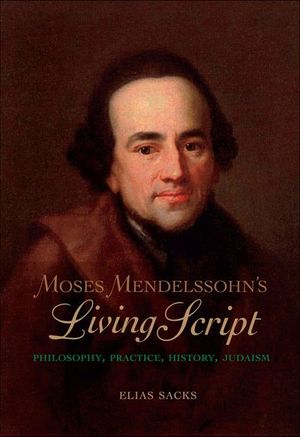Moses Mendelssohn's Living Script
Published by Indiana University Press
Moses Mendelssohn (1729–1786) is often described as the founder of modern Jewish thought and as a leading philosopher of the late Enlightenment. One of Mendelssohn's main concerns was how to conceive of the relationship between Judaism, philosophy, and the civic life of a modern state. Elias Sacks explores Mendelssohn's landmark account of Jewish practice—Judaism's "living script," to use his famous phrase—to present a broader reading of Mendelssohn's writings and extend inquiry into conversations about modernity and religion. By studying Mendelssohn's thought in these dimensions, Sacks suggests that he shows a deep concern with history. Sacks affords a view of a foundational moment in Jewish modernity and forwards new ways of thinking about ritual practice, the development of traditions, and the role of religion in society.
BUY NOW FROM
COMMUNITY REVIEWS

